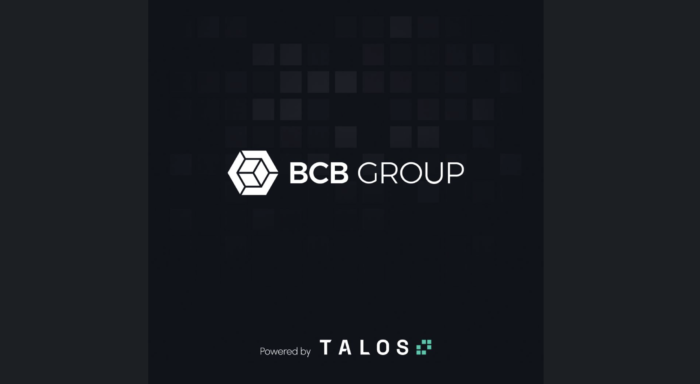
International Women’s Day Panel
We were thrilled to host a panel discussion at our London office to celebrate International Women’s Day 2023.
Sarah von Landsberg-Sadie (Chief People Officer), Oliver Tonkin (Co-Founder and General Counsel), Agathe Laissus (General Counsel), Kate Stuart (Associate Director of Treasury Operations), and Kym Routledge (Head of Financial Crime) sat down to discuss this years theme of #EmbraceEquity, moderated by Ashley Pope (Executive Director of Banking and Payments).
AP: Morning everyone, thanks for joining us. Let’s kick off with the first question: how does it feel to be a woman at BCB Group?
KS: I can obviously only speak from my own experience, but I feel very valued at BCB Group. At other businesses where I have worked previously, especially large corporates, you really are just a number. At BCB, the majority of people in the company know what you do, they know who you are, they’ll come over and say hello. People really make the effort in the office to introduce themselves and find out what other people are working on. I feel very proud to work at BCB.
AL: It feels like I have arrived in a role that really fulfils me. As someone who works remotely most of the time, being based in Europe, I don’t feel any different. I don’t feel as though I am any less visible or I am being less heard than everyone else. From what I have experienced, the BCB culture is one that encourages women to speak up whenever they need to, which is fantastic.
KR: If I think about some of the places where I have worked before, BCB is definitely different. Everyone that I speak to is very accommodating and I don’t feel as though I am treated any different because I am a woman. I’m just treated for the job I have to do.
AP: Do you feel that BCB Group is a good place to work in terms of work life balance and family life balance? How does it compare to other places that you have worked?
KR: Work life balance is incredibly important to me and I would never have taken the job at BCB if I didn’t think they supported that. I love coming into the office and working surrounded by people, but equally I’m a farmer, I just want to be with my animals! So BCB allows me to have that 50/50 split which makes such a difference.
AP: Sarah, from your point of view, how does it feel to be one of the first women on the C-suite, paving the way for others?
SVLS: I agree with everything I’ve heard. I think that compared with other places that I have worked, BCB is phenomenal. I also come at this from the perspective of my job here which is to shine a light on all of these issues, and to notice what is hidden. I have not come across a situation here where I have been treated differently because I am a woman. I feel massively empowered and respected by the men and women I work with every day. However, whenever you are in the minority in any group, whether that minority is 1 in 10 or 2 in 10, and whether that minority is gender-led or something else led, it is essential to watch out for the potential issues that can arise. For example, do we have women walking into meetings where they are the only woman? Or the only junior woman in a room full of senior men? How does that impact their confidence? Do they hold back slightly? This is not necessarily visible, but it matters. And it is part of my job to notice that and take action to call that out.
We are male dominated, especially at the top. So it is something we need to be aware of, those less visible effects of being in the minority. And there are many other differences that we can and must call out. It is essential to notice when you are in the majority or minority in the room and be mindful of the impact of that.
AP: Do you feel like BCB has been empowered by the way you are leading the People Team, and also generally because of the individuals that we have working here? It would be great to hear from anyone on the panel if they think that BCB is unique in its approach to challenging societal norms.
KS: I think from a societal point of view, BCB has definitely empowered me. Traditionally you would find that a man earns more money than a woman, however I actually earn more money than my partner. Just because we are in a male-dominated company, or we have more men at the top, it doesn’t mean it is going to be that way forever. I would never want to be promoted to a more senior role just because I am a woman and I’m ticking that box. I want those roles because I deserve them.
KR: On that point, I totally agree. I would never give anyone a job just because they fit a minority. They would get the job because they are the best person for it. When I hand my CV in, I get that job based on me, and not because of my gender, my age, my sexual orientation, or anything else. It is about making sure that women get an equal footing to all job opportunities. If there were going to be more roles added to the Board or Exco, women should be invited to throw their hat in the ring.
AP: So if we take a step back to opportunity as teenagers and at school, are there some individuals who could be high potential but didn’t quite have the opportunity to get there because of discrimination before they got to BCB? Is there a wider question about how we assess those people and how we could bring them into the company and allow them to thrive?
SVLS: I would love to hear from Agathe as a woman working in a very male dominated industry, the legal industry, for her perspective.
AL: I’m going to be blunt. It is hard sometimes to evolve in a male dominated environment because sometimes you just don’t use the same language. If I take the example of a law firm, where I’ve spent most of my career, we would be rated on billable hours, how many clients we would bring in, etc. Some of the ratings were very male-centric. For example, because the woman is usually the one taking notes during a meeting, rather than talking directly to the client, she wouldn’t have the visibility that was necessary to bring in clients, that was necessary to bill those hours. I personally found, after fighting the system for a long time, I asked myself ‘is this system right for me?’ and it wasn’t. So I decided to move to an environment that was more open to me evolving to be the best lawyer that I can be.
I do think that women do not necessarily have all the same chances, regardless of whether you went to university. We don’t necessarily get the first role. We have to fight harder. This doesn’t mean that we won’t get there, but it is the elephant in the room and we need to say it like it is. It is out there. It requires more persistence and resilience from our side. So I agree with Kate and Kym that we don’t want to hire women into leadership roles just because they are women, but we should also not push them into those roles if they don’t want it. Some women don’t necessarily want those roles, they’re more than happy to be facilitators, to be project leaders, rather than leading the overall company. Maybe this is a controversial take, but that is how I feel.
AP: Oliver, you’ve been in the legal field for a while now. Is this something that resonates with you that you have seen throughout your career?
OT: Yes it does, to be honest. I’ve been in the law for a long time, I qualified in 2000 and in my cohort I believe there were 40 people who qualified and around 20 of those were women and honestly, they were probably better than the men. They were higher performing academically. But interestingly I saw the other day that there was a discussion about how many of those 20 women had become a Partner in a law firm. The answer was one. It was quite shocking to me. It’s a shame to think that women might have to become something they’re not, to change their outward persona, in order to be accepted in those fields.
So why is that? I guess the elephant in the room is having kids. At one point in time, that certainly was kryptonite for one’s chances of having a career in the law. You were perceived as not being as available as your male colleagues. I think there are also issues with the structure at the top, as most Partners at law firms are male. Therefore, if you want to talk to them and bond with them on a more personal level, they want to talk about sports and perhaps other topics that a woman might not feel so comfortable engaging in. So it becomes harder for women to form those relationships in the same way as men do. I hope it’s changed but it certainly wasn’t great in the early 2000s.
SVLS: I think there is a really important point to make here and that is that men have kids too. How many mothers are noticed for leaning in like a man because they have children? Versus men who have children who behave in exactly the same way and aren’t called out for it? There is power on both sides. On the male side of the equation, the power lies in leaning the other way. In making it okay to take parental leave. On the female side, I have faced those moments of pressure of trying to have it all. My career has spanned 22 and a half years and there have been pivotal moments throughout where I have had to decide whether to lean back away from my career for personal reasons or lean into it. I have had to battle those societal expectations and judgement, and say to myself that it is okay to take a step back. There is a shift there on both sides for men and women. The power and the responsibility is on both.
AP: Kate, how does hearing this make you feel as someone who doesn’t have kids?
KS: From an impartial perspective, I would say that BCB, from my visibility, has given people the opportunity to have families if they want them. I have no doubts in my mind that if I did choose to go down that route, I would be supported along the way.
AL: So I was actually hired by BCB Group while I was pregnant, and from that perspective I think that BCB rocks in terms of how pregnant women are treated. Everyone was supportive, and made sure that I would only come back to work when I was ready. I was allowed to take a parental leave which I ended up not needing because my workload was so light as Oliver worked so hard to take on the lion’s share, to ensure that my integration back was smooth. I could work from home as much as I wanted. And it just keeps getting better and better. I have a really good work/life balance which BCB has facilitated.
I do believe that women can have it all, but you need a support system. It also shouldn’t be pushed upon you to have it all, you should be able to decide what you want to take on, and talk to your manager honestly about that. Your team should be part of your support system and that has been my experience at BCB Group.
AP: What would be the one piece of advice that you would give your younger self?
SVLS: To quote L’Oreal; “I’m worth it”. It is what you believe that matters far more than what anyone else thinks. You need to believe in yourself.
KS: Setbacks aren’t permanent.
KR: Kindness equals happiness. If you’re kind to other people, it will come back to you in happiness.
AL: Get to know yourself really well; your superpowers and your weaknesses. Make sure you shape your career path around those qualities.
OT: Treat people well, treat people with respect, treat people how you want to be treated. It doesn’t matter if you are a man or a woman.
AP: We have some time now for a quick Q&A session. Does anyone have any questions for the panel?
Q: What do you want the women of BCB to learn from this panel today?
OT: I’m always really surprised when I hear women say ‘I’m really intimidated because there are a lot of men in this meeting’.I obviously can’t fully understand that because I’m not a woman but my advice would be don’t be shy or reticent in providing your opinions. Those opinions, hopefully more times than not, will be respected and listened to.
SVLS: There is research that has shown which jobs men and women apply for comparing the qualifications of the candidate versus the job ad. What this research found is that men will apply for a job if they meet about 30% of the criteria. However, a woman won’t apply unless she meets at least 80%. We need to take that unconscious bias and understand that.
Q: Do you think women make better leaders? And do you think that women actually support other women in their career progression?
KR: I actually think there have been more women that have damaged my career than men. There are a lot of senior women who have worked incredibly hard to get to the top and then they shoot other women down once they get there. In my opinion, it doesn’t matter what gender, ethnicity, or sexual orientation a leader is; it is their individual qualities that make them a good leader.
BCB Group comprises BCB Prime Services Ltd (UK), BCB Payments Ltd (UK), BCB Digital Ltd (UK) and BCB Prime Services (Switzerland) LLC. BCB Payments Ltd is regulated by the Financial Conduct Authority, no. 807377, under the Payment Services Regulations 2017 as an Authorised Payment Institution. BCB Prime Services (Switzerland) LLC, a company incorporated under the laws of the Swiss Confederation in the canton of Neuchâtel with business identification number CHE-415.135.958, is an SRO member of VQF, an officially recognized self-regulatory organization (SRO) according to the Swiss Anti-Money Laundering Act. This update: 14 Oct 2020.
The information contained in this document should not be relied upon by investors or any other persons to make financial decisions. It is gathered from various sources and should not be construed as guidance. The information contained herein is for informational purposes only and should not be construed as an offer, solicitation of an offer, or an inducement to buy or sell digital assets or any equivalents or any security or investment product of any kind either generally or in any jurisdiction where the offer or sale is not permitted. The views expressed in this document about the markets, market participants and/or digital assets accurately reflect the views of BCB Group. While opinions stated are honestly held, they are not guarantees, should not be relied on and are subject to change. The information or opinions provided should not be taken as specific advice on the merits of any investment decision. This document may contain statements about expected or anticipated future events and financial results that are forward-looking in nature and, as a result, are subject to certain risks and uncertainties, such as general economic, market and business conditions, new legislation and regulatory actions, competitive and general economic factors and conditions and the occurrence of unexpected events. Past performance of the digital asset markets or markets in their derivative instruments is not a viable indication of future performance with actual results possibly differing materially from those stated herein. We will not be responsible for any losses incurred by a client as a result of decisions made based on any information provided.






